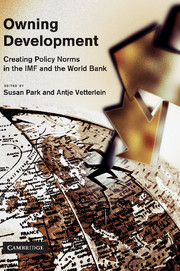Book contents
- Frontmatter
- Contents
- List of figures
- List of tables
- List of contributors
- Preface and acknowledgements
- List of acronyms and abbreviations
- Part One Introduction
- Part Two Norm emergence
- 2 Internal or external norm champions: the IMF and multilateral debt relief
- 3 From three to five: the World Bank's pension reform policy norm
- 4 The strategic social construction of the World Bank's gender and development policy norm
- Part Three Norm stabilization
- Part Four Norm subsiding
- Part Five Conclusion
- Bibliography
- Index
2 - Internal or external norm champions: the IMF and multilateral debt relief
Published online by Cambridge University Press: 02 December 2010
- Frontmatter
- Contents
- List of figures
- List of tables
- List of contributors
- Preface and acknowledgements
- List of acronyms and abbreviations
- Part One Introduction
- Part Two Norm emergence
- 2 Internal or external norm champions: the IMF and multilateral debt relief
- 3 From three to five: the World Bank's pension reform policy norm
- 4 The strategic social construction of the World Bank's gender and development policy norm
- Part Three Norm stabilization
- Part Four Norm subsiding
- Part Five Conclusion
- Bibliography
- Index
Summary
Introduction
The views of a small number of industrialized states, along with non-governmental organizations (NGOs), and eventually the World Bank converged in favour of the appropriateness of multilateral debt relief for poor countries. They attempted to persuade powerful member states and the International Monetary Fund (IMF) to endorse an emerging policy norm on multilateral debt relief. Yet, the IMF staff, trained as neoclassical economists and socialized within a technocratic organizational culture that had been hesitant to adopt the multilateral debt relief norm, was unable to translate debt relief into policy without serious modifications, leading to an IMF-devised policy norm. This chapter traces how IMF staff and management interactions with the Fund's board and other external actors enabled the emergence of the heavily indebted poor countries (HIPC) policy norm. The HIPC policy norm was more compatible with the Fund's belief system and organizational culture (compared with the social development norm, for example; see Vetterlein, chapter 5 this volume).
Key states, acting as norm advocates, first raised the idea of giving debt relief to poor countries in the early 1980s. These states attempted to negotiate and persuade other states, IO leaders and staff that debt relief was necessary to ensure the economic viability of what would become known as ‘heavily indebted poor countries’. The HIPC had per capita income below US$785 and could only borrow under the terms of both the World Bank's International Development Agency (IDA) and the IMF's Poverty Reduction and Growth Facility (PRGF) (Teunissen and Akkerman 2004: xxiii).
- Type
- Chapter
- Information
- Owning DevelopmentCreating Policy Norms in the IMF and the World Bank, pp. 29 - 47Publisher: Cambridge University PressPrint publication year: 2010
- 11
- Cited by



